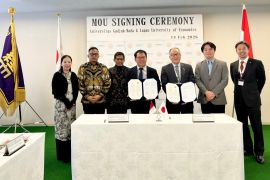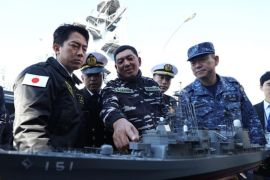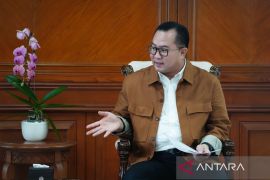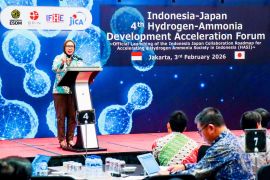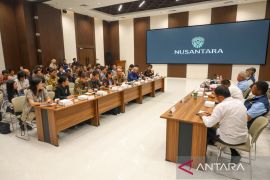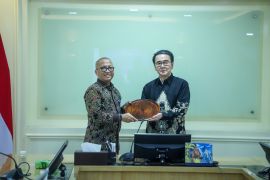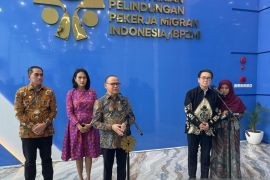In developing its entire planned infrastructure, Indonesia requires a total financing of around Rp5,000 trillion rupiah (about US$360.5 billion).
The government however has no enough funds to finance its projects. It needs to cooperate with the private sector and invite foreign investors.
"It is impossible to source funding of such magnitude from within the country. It means that we need to attract foreign investors," Minister of State-Owned Enterprises Rini Soemarno emphasized, after attending an energy forum last month.
Therefore, Indonesia is now actively seeking investors from overseas. One of the foreign countries considered to be potential for investing in Indonesia is Japan.
In 2016 for example, Japan is considered to be a potential source of foreign direct investment.
The Head of Indonesias Investment Coordinating Board (BKPM), Franky Sibarani stated that Japan will become a source of Foreign Direct Investment (FDI) in 2016.
To maintain a positive trend in Japanese investment, BKPM officials plan to visit Tokyo, Japan, to promote investment cooperation with the local trade chambers.
"Japan will remain an investment fountain in the FDI program, as it plans to enter Indonesia next year," Franky said.
The BKPM has set a target to attract US$13 billion in investment commitments from Japan in 2016. The commitment target was expected to come from the number of principle licenses issued for Japan in Indonesia, Franky told a seminar on investing in Indonesias industrial sector.
"The Japanese investors have the character that needs the cooperation of all parties, both the central and regional governments. We hope the BKPM and the Indonesian Embassy in Tokyo would continue to increase cooperation to attract as many Japanese investors as possible," Franky said.
Based on the investment record of BKPM, during the period of October 22, 2014 to December 4, 2015, Japanese investment interest was pegged at US$11.4 billion. Japanese companies have already received principle permits of up to US$5.7 billion.
With Japan, Indonesia will cooperate in the development of infrastructure such as seaports, airports, railway tracks and other projects. In a press statement recently, the Ministry of Transportation said the two sides agreed to cooperate when Transportation Minister Ignasius Jonan visited Tokyo, and met with Japanese Minister for Defense, Infrastructure, Transportation and Tourism, Keiichi Isii.
"This cooperation is important for the two countries, particularly in the development of infrastructure in the transportation sector," the minister said.
Regarding sea transportation, Jonan made a push for the Indonesian governments program to become an advanced and self-reliant maritime country and emerge as the worlds maritime axis. A number of supporting programs will also be implemented, such as the sea toll project.
"Sea toll is in principle a fixed and regular transportation service using large ships with feeder vessels. The transportation service connects the western tip and the eastern part of Indonesia, thus ensuring economic benefits," the minister said.
Besides the possibility of cooperation in the sea transportation sector, Jonan also explained other programs such as the construction of the Trans Sumatra Railway project, Trans Kalimantan, Trans Sulawesi and Trans Papua.
The Japanese government hailed the programs and said it was ready to support the plan for developing infrastructure in the transportation sector in Indonesia.
According to BKPM chief Franky Sibarani, the investment official will therefore provide Japanese investors with information regarding Indonesias investment policies, such as a three hour-investment license service, investment opportunities in various sectors, especially the priority like labor-intensive industry, infrastructures, and tourism.
"These three priority sectors are major contributors of Japanese investment," Franky noted, adding, that these sectors also include major investment categories developed by BKPMs marketing team.
The Japanese investment in the labor-intensive sector has reached US$2.05 billion, the infrastructure sector is US$700 million and regional tourism is US$650 million.
"Many Japanese companies have received principle licenses. Their commitment for investment in the infrastructure sector has reached US$4.6 billion and in the labor-intensive industry has risen to US$607 million," he noted.
Japan is the second largest investor country in Indonesia after Singapore with a total investment commitment of US$14.6 billion, Franky said. It contributes some 10.5 percent of the total investment entering the country since 2010 until the third quarter of 2015.
Japan is one of the main contributors for the realization of Indonesias investment target. Data indicates that investment realization for the January to September 2015 period, released by BKPM, showed that Japan was placed third, with an investment of US$2.5 billion in 1,318 Indonesian projects.
Japan is ranked below Singapore, which has invested US$3.55 billion in 1,979 projects and Malaysia, which has invested US$2.9 billion in 600 projects.
Japanese Ambassador to Indonesia Yasuaki Tanizaki said last month (November 27) that Japan has provided Indonesia with a loan of 140.051 billion yen (US$1.14 billion) to finance infrastructure projects, particularly three transportation infrastructure projects in Indonesia.
"The first project is the Mass Rapid Transit (MRT) for the East-West line. For this project implemented in Jakarta, we are giving loans worth 1,919 billion yen for the first phase," Tanizaki said.
The second project is the North-South MRT lines including the underground lines. The loan for this amounts to 75.218 billion yen. "These two projects, it is believed, will improve Indonesias investment climate and boost economic growth," he added.
Meanwhile, the third project is the Java-Sumatra transmission to deliver electricity with loans worth 62.914 billion yen. The transmission is a power supply system for Java-Bali and Sumatra.
The project implemented in South Sumatra province will supply electrical energy which is derived from the coal power plant.(*)
Reporter: Andi Abdussalam
Editor: Heru Purwanto
Copyright © ANTARA 2015
